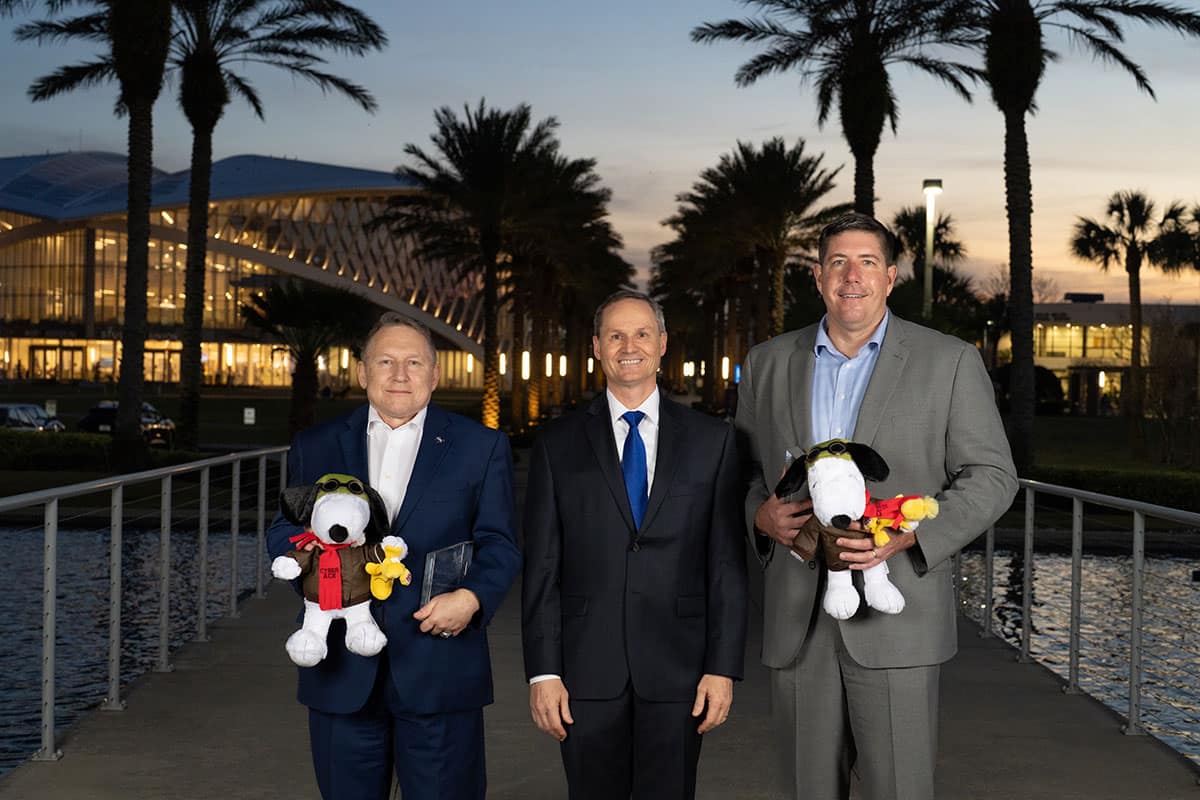Two Cybersecurity Leaders Honored at Embry-Riddle Expert Symposium on Safeguarding the Skies and Space

Brian Connolly and Paul Hoyt Nelson have earned Aerospace Cybersecurity Excellence Leadership Awards, which are presented by Embry-Riddle Aeronautical University to recognize excellence in combatting cyberattacks on the global aerospace community.
The ACE Leadership Award winners were announced on Feb. 4 at the 2025 Embry-Riddle President’s Forum on Research and Innovation: Symposium on Aviation and Aerospace Cyber Resilience, an annual event that brings together experts in academia, industry and government. The event and the awards are organized by the university’s Center for Aerospace Resilient Systems (CARS).
Connolly, vice president and chief engineer for product security at The Boeing Company, said he appreciated the wide range of attendees.
“The most valuable part of the symposium is the face-to-face interaction and exchange of ideas with a broad range of aviation security professionals, from our airline’s customers to regulators and government partners to our supply base,” he said.
At Boeing, Connolly develops product security strategy and leads cybersecurity engineering efforts and innovation. His ACE Award highlighted his executive leadership.
Prior to joining Boeing, he was the director of IT and cybersecurity at the U.S. Naval Air Warfare Center. He was also the technical director of NAVAIR’s Digital Office, where he helped implement a comprehensive technical roadmap to digitally integrate naval aviation warfighting capabilities, data sources and models. Before NAVAIR, Connolly was a senior consultant to the U.S. government in areas ranging from systems engineering to software design and development.
In announcing Connolly’s award, Dan Diessner, executive director of CARS, said he had “the pleasure to get to know [Connolly] and personally experience his commitment to our cybersecurity mission and his exceptional leadership.”
Nelson, who leads the NASA Aeronautics Research Mission’s cybersecurity efforts, was honored with an ACE Award in recognition of his technical leadership. In his combined architect and management role, Nelson leads the research and development of aviation cybersecurity capabilities while ensuring that such work produces secure technologies for NASA’s stakeholders. He is also NASA’s principal aviation cybersecurity liaison to government agencies and industry and has served as a NASA chief information security officer, director of research and development for the NASA Office of Inspector General Computer Crimes Division, a Computer Crimes Division investigator, as well as in other roles within NASA. In all his positions, he has emphasized staff mentoring to adapt to fast-changing technology and develop talent.
Diessner, who described Nelson as a friend and colleague of many years at the awards ceremony, told Nelson, “I greatly admire and appreciate your dedication to the cybersecurity, cyber-safety and cyber-resilience of our aviation and aerospace critical infrastructure.”
Introduced in 2023, the ACE Leadership Awards were named after the term Flying Ace, coined in World War I to refer to pilots recognized for helping to win the war by being excellent at taking down the enemy.
In addition to the symposium, Embry-Riddle hosted its third Aviation Cyber Initiative Cyber Rodeo. An interactive experience, the event featured industry and government partners engaging with students and faculty in poster sessions, technical briefings and an expo. More than 300 attendees also participated in a Capture-the-Flag challenge, where teams competed to devise the best defenses to address an aviation cyber emergency.
In a welcome letter to the symposium, Embry‑Riddle President P. Barry Butler, Ph.D., emphasized the importance of meeting aerospace cybersecurity challenges head-on as technology in planes increases, more aircraft operate in the airspace and the space sector expands. This, he said, all contributes to increasingly complex and interconnected systems.
“We hope the 2025 Symposium on Aviation and Aerospace Cyber Resilience will serve, once again, as a platform for a broad spectrum of stakeholders and participants to share knowledge that will ensure the safety, security and resilience of our aviation and aerospace systems,” Butler said.

 Michaela Jarvis
Michaela Jarvis